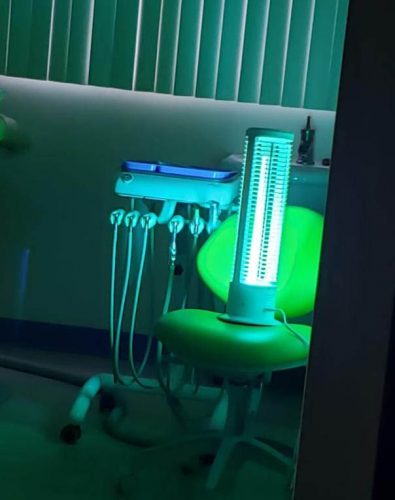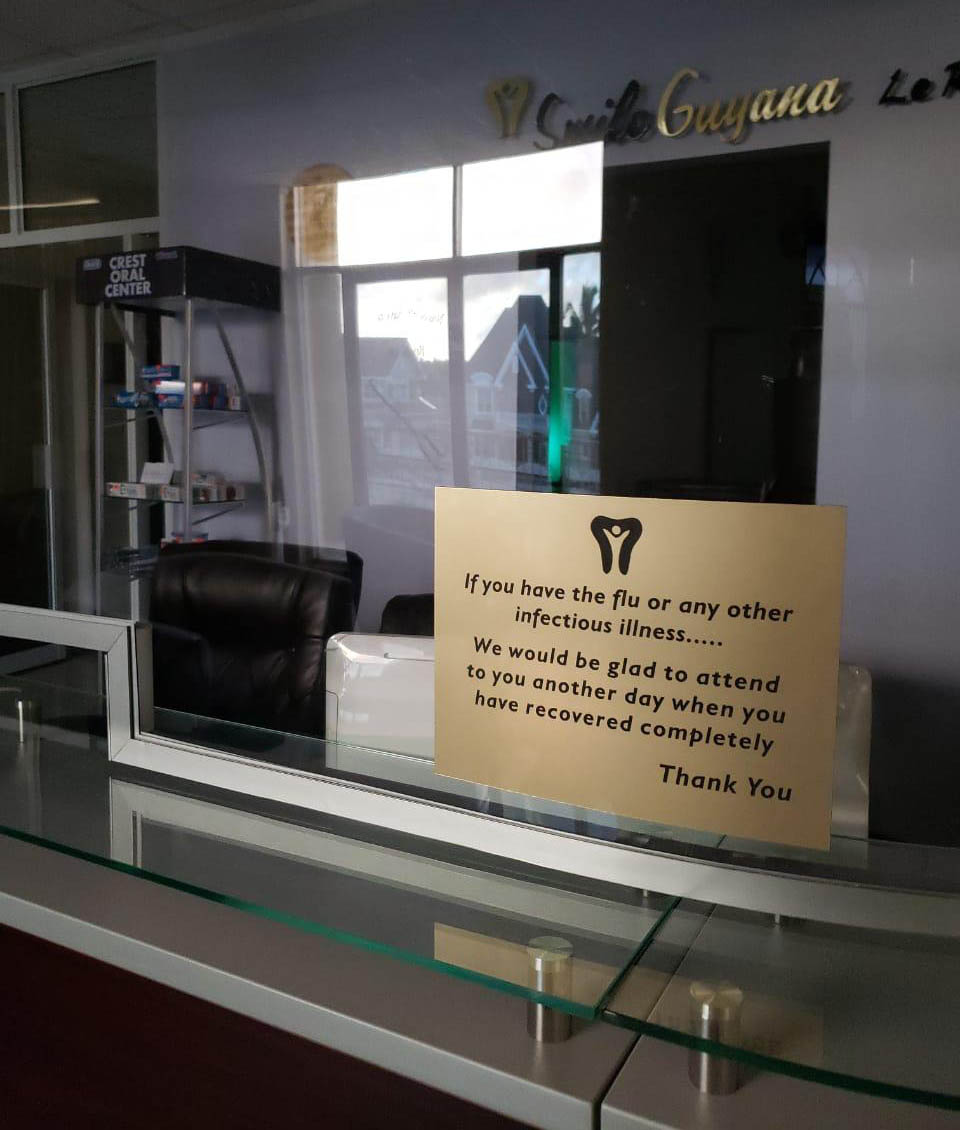In wake of the COVID-19 outbreak in Guyana, the careful sanitization of dental practices has become integral to ensuring the safety, according to dentists.
Both Dr Ian Jagan, of the Jagan Dental Centre, and Dr Theodora Madekurozwa, the founder and Managing Director of Smile Guyana Dental Clinic, told Sunday Stabroek that the safety of their clients and staff is priority when continuing operations as COVID-19 continues to spread.
The World Health Organization (WHO) has said that dentists, hygienists, and other oral care providers have a heightened risk of contracting COVID-19 and passing it to patients because “they are in close contact with their patients’ mouths, use spray-generating equipment that produces airborne particles, [and] are exposed to saliva, blood and body fluids.”

As a result, WHO advises that routine non-essential oral health care—such as check-ups, dental cleanings, and preventive care—be delayed until there has been sufficient reduction in COVID-19 transmission rates.
During a telephone interview, Jagan noted that at the start of partial lockdown, his Dental Centre continued with consultations by phone and Facebook, particularly to cater to emergency cases. “In some cases, we would ask that they take a photo or two to see the case. Accordingly we would prescribe the medication if we know that that would help in the meantime,” he explained.
He said that the centre was closed for around six weeks following the initial COVID-19 outbreak. Upon its reopening, stringent protocols were adopted and in some cases rules that were already in place became stricter than before. “We had initially closed our office for approximately six weeks. Around that time it was the initial breakout of COVID-19 here in Guyana. [And] for that time, we were basically assessing the situation worldwide and in Guyana, in terms of the virus outbreak and gathering information on various different methods and techniques that we could implement to further prioritise safety at our clinic,” Jagan said, while citing organizations such as the American Dental Association (ADA), the Indian Dental Association (IDA) and the Canadian Dental Association (CDA) as being among entities from which they drew guidance.
According to Jagan, the new measures included the sanitization of hands upon entering the clinic, the mandatory use of masks and face shields by staff and even requesting that patients show up unaccompanied.
“Prior to this, we at Jagan Dental Centre were seeing walk-in cases along with appointment cases but due to the virus’ outbreak we were doing it by appointment only. That would give us a better idea on how to plan the day in terms of giving more time towards a specific appointment. We created a questionnaire which was asked over the phone. [We were] basically asking the patient their history of travel, history of symptoms, contact and things like that which could be gained over the phone. And increasing the time for cleaning,” he said.
To avoid overcrowding in the waiting rooms, the Jagan Dental Centre would also ask persons who travelled by car or with their personal vehicles to wait in them until they were ready to be seen for their respective appointments. “If by chance there was need for waiting in our waiting room, thankfully the space was sufficient to accommodate a few patients and keep a six feet distance. So that was good for us,” the root canal specialist said.
The Dental Centre also took the liberty of purchasing a pulse oximetry monitor, which records the oxygen saturation rate of the patient. “We basically bought the monitor and we would test that for each patient entering. It would give an idea of the saturation level of the oxygen in the patients’ blood. It is said in a few studies that it can help to identify a possible respiratory problem in a patient. So we implemented that,” Jagan explained.
He emphasized that sterilization at the Dental Centre as being a priority from the inception, while noting that while frequent cleaning and sterilizing of instruments were always done in keeping with professional practices.
Apart from masks or face shields, hazmat suits are worn when doing procedures that can result in the production of aerosols. “For example cleaning, filling or root canal, where by the drill or ultrasonic dental scaler would vibrate at rapid rates and come in contact with the saliva and produce an aerosol. In cases like that, the suit is one hundred per cent used. Thankfully we have a few operating rooms available so we keep a room or two specifically for aerosol procedures and then we have the other rooms where checkups are done, extractions are done, [and] those procedures where the drill and ultrasonic dental scaler are used so the air in that regard is a lot less contaminated,” the dentist said.
Jagan also said that the rubber dam or dental dam is also used when doing a filling or root canal on the tooth. “You would use the rubber dam which would isolate the tooth you are working on from the oral cavity so when using that drill, it is not creating that aerosol to the saliva. So that is a very important, not necessarily an addition but it isn’t standard and is something that is proven, study-wise, and implemented at Jagan Dental Centre,” he added.
Enter healthy, leave healthy
Meanwhile, Madekurozwa said that previously the Smile Guyana Dental Clinic accepted walk-in appointments but now clients are seen by appointment. Before a person can make an appointment, they have to provide information regarding their travel history and health. Madekurozwa explained that clients are asked about their health and travel history because she doesn’t want to risk persons attending her clinic to become sick, whether by being infected with the potentially fatal disease or any other ailments. Madekurowza said that she wants persons to attend her clinic and feel safe and one of the steps in doing so is to ensure persons enter healthy and leave healthy.
A person with a slight cold, sore throat or even a cough, she said, is not allowed to make appointments at this time. To prove how strict her regime has become she disclosed that a staff member had been experiencing some symptoms of a sore throat and was asked to stay home for a two week period, with pay, for the safety of the rest of the staff and clients.
After getting an appointment and showing up at the clinic, persons are once again asked about their travel history and current health status, Madekurozwa said. This is to ensure that persons are indeed healthy enough to be around the staff. Clients are also asked to show up alone unless it is necessary for them to be accompanied by one other person.
Sanitising at Smile Guyana has become a major priority Madekurozwa said. “We have placed a mat with disinfectant at the door for persons to have their shoes sanitized. So they step on the mat upon entering because of all the things that can be picked up on the shoes from the road,” she detailed. After having their shoes sanitized, a client’s temperature is checked and then further sanitizing of hands is done. The dentist noted that there is no waiting area for persons. She said that the seats in the waiting area were removed so that persons have no need to stay for longer than is necessary but most importantly to stop persons from being gathered in the clinic at any given time.
Madekurozwa informed that the cleanliness of the clinic has always been crucial for the wellbeing of all who visit the clinic but it was the seriousness of COVID-19 that sparked the need for reinforcements. She said that after the first case in Guyana was announced, the clinic was closed and upon reopening recently she ensured that health and safety equipment was installed so that the clinic would be safe and ready for operation. By following many international health standards, she and her staff felt as though operations could restart. But she noted that the installation of much of the protective gear for the clinic and staff cost a little over one million dollars. She said the wait for sneeze guards to be installed and the purchase of washing machines to have the staff’s protective wear cleaned regularly were “rough” but necessary.
To add to her expenses she had to purchase equipment to have the air in the operating rooms filtered because she saw the need for the air in the rooms to be clean at all time. She noted that the disease has been said to travel by air, which is why filtering can help with stemming its transmission.
During operations, the dentist said that she has one staff member join her for assistance but she tries to maintain the bare minimum of persons in the operating room as much as possible. She said that hazmat suits and personal protective equipment are standard for her staff and the equipment must be cleaned after every use. Sanitizing of the room and equipment is also done after every procedure.
A dentist at the C. Persaud Dental Clinic and Lab also spoke to this newspaper. The dentist explained that the clinic has adopted similar procedures as those being followed at the Jagan Dental Centre. He explained that for almost six weeks the clinic was closed and that upon reopening, they have decided to have person’s temperatures checked and work strictly by the use of appointments. Additionally, persons are asked to come alone unless it is absolutely necessary for a person to accompany them.






